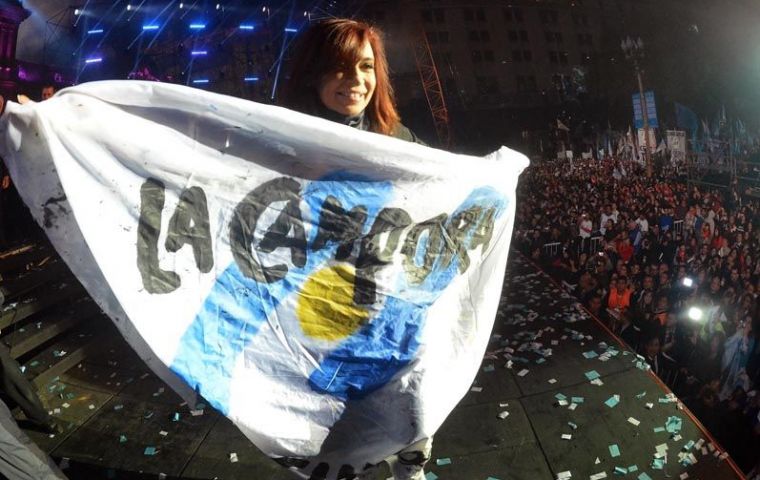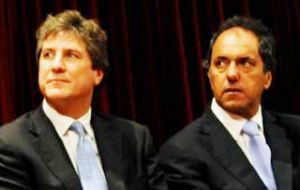MercoPress. South Atlantic News Agency
More Kirchnerism from less votes; Election result won’t bring change of direction
 Almost seven out of ten voted against Kirchnerism
Almost seven out of ten voted against Kirchnerism By Rosendo Fraga (*) - On presidential instructions, the ruling party headed by Acting President Amado Boudou and Buenos Aires Governor Daniel Scioli endeavored to transform Sunday night’s midterm election defeat into a result living up to the Victory Front’s name.
To that end, the same argument the party fielded in the PASO primaries, of being the first electoral minority, was trotted out again, adding allied votes to its own and thus padding out the percentage to nigh on a third of the total to reinforce its case.
Added to this was the fact that the government has not lost control of Congress in these midterm elections. It dropped three seats in the Senate but still retains an overall majority by two. In the Lower House it even added a seat, allowing it to comfortably achieve quorum with its allies.
This interpretation — that the ruling party really won — suggests that in the next few days it will radicalize its policies and not change direction, over and above adopting any economic measures considered convenient to net dollars. The early signs on election night showed that Kirchnerism does not accept Scioli’s presidential candidacy for 2015 as a fait accompli, pushing forth other alternatives from its own midst such as the governors of Chaco (Jorge Capitanich) and Entre Ríos (Sergio Uribarri). If there are Cabinet changes, these will be to regroup politically, not economically.
The opposition sees the result as a victory and has reasons to, since almost seven out of every 10 voters opted for candidates from its diverse strands. It roundly defeated the Victory Front in the country’s five most important districts — Buenos Aires province, the Federal Capital, Santa Fe, Córdoba and Mendoza, which between them have 70% of the national vote. But it also triumphed by big margins in smaller provinces such as Santa Cruz, Chubut, Neuquén (the MPN Neuquén Popular Movement senators-elect respond to dissident CGT chief Hugo Moyano) and Corrientes. It again won in San Luis and even notched narrow victories in Catamarca and Jujuy. The reality is that the opposition finished on top in districts that account for 80% of the national vote.
But it was the difference in the decisive Buenos Aires province of almost 12 percentage points, doubling the margin from the primaries, and defining these elections as having favored the opposition. The list headed by Sergio Massa, which continues calling itself Peronist although it groups candidates from different political sectors, not only won in most of the province but also swept all Greater Buenos Aires districts save four, fighting it out vote-by-vote in La Matanza, the historic electoral bastion of the ruling party.
The various presidential candidates and hopefuls for 2015 highlight the problem of the opposition: unity. Nationwide, the ruling party and its allies won almost a third of the vote, as mentioned above, and dissident Peronism in its various expressions a quarter. Another quarter stems from the sum total of the non-Peronist spectrum which can be defined as “social democrat,” integrated by Radicalism, Socialism and other forces such as UNEN in this city. The centre-right PRO garnered less than 10% with its epicenter in the same city and with some advances in the hinterland. The far left took fifth place, winning some seats.
PRO leader Maurico Macri was the first to spell out his presidential aspirations for 2015. His problems to resolve are a lack of insertion in the hinterland and serious limitations when it comes to establishing alliances. The triumphs of Socialist Hermes Binner in Santa Fe and Radical Julio Cobos in Mendoza make them the best presidential hopefuls for 2015 within the social democratic opposition without having clarified any alliance between their respective forces. Within the national ruling party, the aforementioned tendency to push for any candidate but Scioli (who will maintain his aspirations for sure) is quite clear. Within this context Sergio Massa emerges as a hopeful with definite possibilities after announcing that he will go beyond Buenos Aires province to extend his political force nationwide.
The return of the President to her official duties is the main political issue in the immediate aftermath of the election. Even if there are conflicting reports as to her health (and these might well continue to be imponderable right up to the end of her mandate), the most likely scenario is that she will return to office sometime in November to continue ratifying her policies rather than changing them. This will not preclude some changes in her team nor new measures to tackle the economy’s most critical problem, which is the lack of dollars. As written above, the decision to celebrate the electoral result as a victory was hers. But her absence from the political scene has brought to light the differences within her team where the infighting has been aggravated and where the Vice-President (Boudou) is quite blatantly unable to head the government team in her absence, and the Cabinet chief (Juan Manuel Abal Medina) even less so.
In conclusion, the government has decided to insist that it won the election, repeating that they remain the leading party even though they lost votes, and that they have succeeded in maintaining control of Congress. On the other hand, more than two voters of every three opted for the opposition. Its triumph in the major districts was crushing but the difference in favor of Massa defines the verdict as anti-government. The Renewal Front leader remains poised as the presidential hopeful with the best chances but in the two years remaining until the presidential election, many things can still happen.
The president’s return to her duties in the next few days will be the big political issue, a return unlikely to be accompanied by any substantial changes. (Buenos Aires Herald)
(*) Rosendo Fraga is Director of the Centro de Estudios Unión para la Nueva Mayoría think-tank





Top Comments
Disclaimer & comment rules-

-

-

Read all commentsTWIMC
Oct 29th, 2013 - 06:30 pm 0Facts are..:
1) Mid-term elections in Argentina are now over…
2) The present Administration kept its quorum in the Senate…
3) The present Administration increased its quorum in Congress…
4) The present Administration got a renewed democratic mandate…
5) To imply anything else is as futile as trying to demonstrate the squareness of the circle…
6) The present administration will have finished the job of destroying a potentially great country by 2015. Possibly sooner.
Oct 29th, 2013 - 07:01 pm 07) The present administration will see their personal wealth increase dramatically by 2015.
FYI Think the Blue U$ is up today. I see that you didn't post your daily update. I wonder why?
Oct 29th, 2013 - 07:03 pm 0Oh yeah also the MERVAL is down today too...I think the most in the world.
You must have missed both by mistake.
BTW Tomatoes and Bread remain the same.
The Tomato riots of 2014 coming soon.
Commenting for this story is now closed.
If you have a Facebook account, become a fan and comment on our Facebook Page!